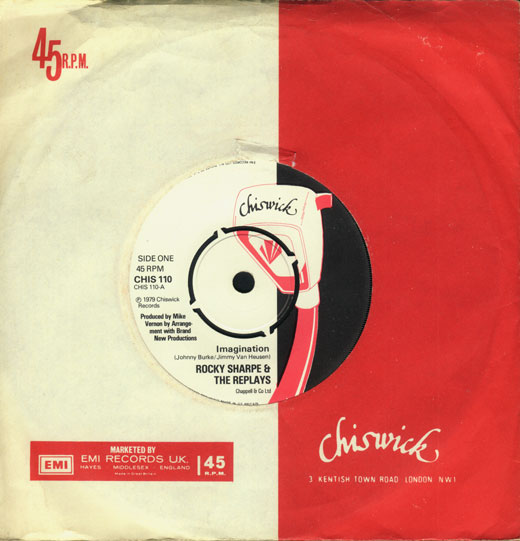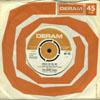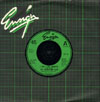|
 -
company sleeves from the 50's to the 80's -
company sleeves from the 50's to the 80's
Click on the images to see a larger version. My comments are bound to be incorrect in places, so please send me
corrections or more info if that's the case. Keep checking back regularly for updates and more scans.
Please do not directly link to these images for your own pages; it won't work.
You require my advance permission to use them; please contact me to make arrangements. The artwork remains copyright of the record company.
Page 2 (Chiswick to Ensign)
(Previous page) (Back to index) (Next page)
Chiswick
Chiswick was another succesful British label born out of the crossover between pub rock and punk rock. Started in 1975 by record salesman Ted Carroll and Roger Armstrong, the label released a number of key punk singles through the late 70s, featuring groups such as The Damned, Motorhead, and the 101'ers. Although the label had gone by 1982, a subsiduary called Ace Records lives on today as one of the most succesful reissue-based labels in the UK.   | | The most common Chiswick sleeve design, featuring a stylistic tone arm and stylus (or is it a shower head?). Rocky Sharpe and The Replays were one of the label's forays outside punk and into the doo-wop revival market. |
Columbia
Not to be confused with the US giant Columbia Records (released here in the UK as CBS), this was EMI's light pop music imprint from the late 50s, through to the 70s. The label's early successes include Cliff Richard, with such stalwarts as Shirley Bassey, Herman's Hermits, Gerry & The Pacemakers and Helen Shapiro following through the 60s, plus a load of instrumental hits for Cliff's backing group, The Shadows. Although if you spot a Columbia single in your local Oxfam, odds are it'll be Ken Dodd "Tears" or Clive Dunn's "Grandad"... .jpg) .jpg) | | The earliest Columbia 7" sleeve, which was also seen on 78rpm records of the time. |
.jpg) .jpg) | | This short-lived label was seen on releases circa 1963. It was the last design to feature the green centre label. |
.jpg) .jpg) | | Towards the end of the 60s, the familiar Columbia design was adjusted simply by changing from green to red. |
Decca
Decca was a UK-based record company, and the owner of several other labels on these pages (most notably their American recordings imprint, London Records, which was the name under which Decca released singles in the US). Its own releases were numerous, featuring light pop from Anthony Newley, bona fide Elvis-challenger Billy Fury, and of course The Rolling Stones. The label lost its way as the 70s dawned (the Stones left in 1970), and with only The Moody Blues, Tom Jones and John Miles' "Music" to keep them going, Decca releases faded away. .jpg) .jpg) | | The classic striped orange sleeve, used from the 50s through the first half of the 60s, with the curved Decca logo on the centre label. |
.jpg) .jpg) | | The second major Decca label, introduced around 1966 and featuring a blue spiral and boxed Decca logo. Other Decca imprints sported the same design with different colours (brown for Deram, red for London and purple for MCA). |
Deram
One of Decca's shrewdest moves was the launch of Deram, a subsiduary label for progressive, experimental and psychedlic rock. Classic Deram hits include Procol Harum's "A Whiter Shade Of Pale" and The Moody Blues "Nights In White Satin", as well as releases from Cat Stevens and Amen Corner. Keep an eye out for DM 123, David Bowie's "Laughing Gnome": if the matrix number is upside down, it's the original release and worth up to £65! The label was occasionally seen on records into the 1980s : Banarama's single "Really Saying Something", for instance.   | | When Deram was launched, parent company Decca was sporting a blue spiral, so this brown version was the initial sleeve design. See the brown circle on the centre of the record? It should have a raised edge on the early releases. |
Ensign
A subsidiary of the Phonogram empire, Ensign was started in 1976 by Chris Hill and Nigel Grainge. The label's most notable success came with releases from Bob Geldof's Boomtown Rats. Sold to Chrysalis in 1984, Ensign is now a dormant part of EMI.   | | Clearly inspired by a sheet of graph paper, this dark green design was the most common Ensign sleeve. |
(Previous page) (Back to index) (Next page)
|








.jpg)
.jpg)
.jpg)
.jpg)
.jpg)
.jpg)
.jpg)
.jpg)
.jpg)
.jpg)



